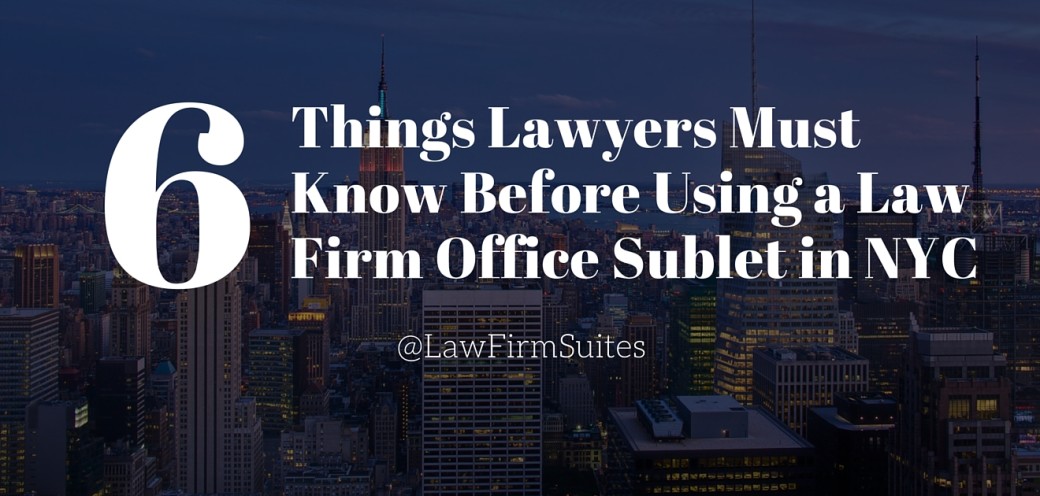An office sublet in NYC can seem like the perfect arrangement for your small firm, but there are some risks to keep in mind before signing any contracts.
If you are a small firm lawyer or even a solo practitioner trying to launch your own firm, it can be a very stressful process finding a law office space that meets all of your needs. For most small firm lawyers, a long-term lease directly with a landlord is beyond your reach, or just unnecessary.
Most firms sublet an extra office space from other law firms. By doing so, small firms can leverage someone else’s long-term financial risk and up-front investment.
Some sublet arrangements can be very productive and last for years. Others can be a nightmare.
Some sublet arrangements can be very productive and last for years. Others can be a nightmare. Click To TweetThere are 6 things that lawyers need to keep in mind before renting an office sublet in NYC:
1. The law firm’s staff does not have your interests in mind.
The most important thing to remember is that the office staff really works for the law firm you rent from, not you. The landlord’s firm supervises and evaluates the staff, and determines their raises and bonuses. Meeting your needs is additional work for no additional compensation. This means that the staff you rely on for office-related issues have their primary allegiance to their firm, so you will risk getting substandard service that could negatively affect your practice.
2. You could be impacted by someone else’s financial instability.
You should understand why the sublessor has extra offices before you sign a lease. If a law firm is spending billable attorney time on subletting office space, there’s a good chance they are not in a stable financial situation.
Renting office space from a firm in financial peril is risky. One day, you may show up to the office ready to prep for trial, only to find a Sheriff’s eviction notice and no time to find a new office. Before moving in, you should find out if the firm’s business has taken a downturn, whether there have been layoffs and if they are “current” with their obligations to the landlord.
Before subletting, know why a law firm has extra offices. Click To Tweet3. You might be sacrificing quality service.
Small firm attorneys often enter into cheap law office sublet arrangements to save money. However, it is never usually a wise thing to go the cheap route because, ultimately, you get what you pay for.
For example, in an effort to cut costs, a firm might not hire highly-trained staff to manage the office. This means you may have to deal with an unprofessional receptionist directing your calls or greeting your clients.
Another common problem you could face in a cheap law firm sublet arrangement is internet issues and insufficient bandwidth. In this case, you’ll have to purchase your own reliable connection at an additional cost.
4. You have to play by their rules.
Since you are occupying space within another law firm, they may not have rules that work in your favor. Law firms subletting space can make rules that are unfair or even odd. For instance, a common rule in sublets is that you share the cost of paper even if you do not use the copier, or that you can only use the conference room when your landlord’s firm doesn’t need it.
5. The law firm might not need you some day.
You should be mindful of the fact that a law firm office sublet may not be as long term of a solution as you had first hoped.
Sometimes firms law firms sublet extra offices because they have very little time left on a lease that they do not have any intention to renew. These firms often offer space at too-good-to-be-true prices to offset costs for the remainder of their lease, but don’t expect them to disclose that there are only a few months left on the lease.
Other times, growing firms will use extra office space once sublet to solos for their own new hires, or they will simply absorb the cost of empty offices without subtenants. If the firm you sublet from finds their economic stride, there’s a good chance your sublease agreement won’t be renewed.
6. You are not a priority for your landlord.
When you rent an apartment, your landlord’s job is to make sure your expectations are met and to fix issues as they arise. Unlike a professional landlord, a law firm is not in the business of renting office space.
The law firm that sublets empty office spaces likely does not have the bandwidth to adequately service your most basic needs, nor are they incentivized enough to give great service. There is much more money to be made billing clients than keeping subtenants happy. In many cases, simply expect to be viewed as a source for cash to offset expenses, and your needs to be a nuisance to their primary duty: practicing law.
As you can see, there can be several downsides to subletting an office from another law firm. There is no guarantee that a sublet office will offer your small firm or solo practice a quality office experience at a good value. But by understanding the risks, you can mitigate any damages.


